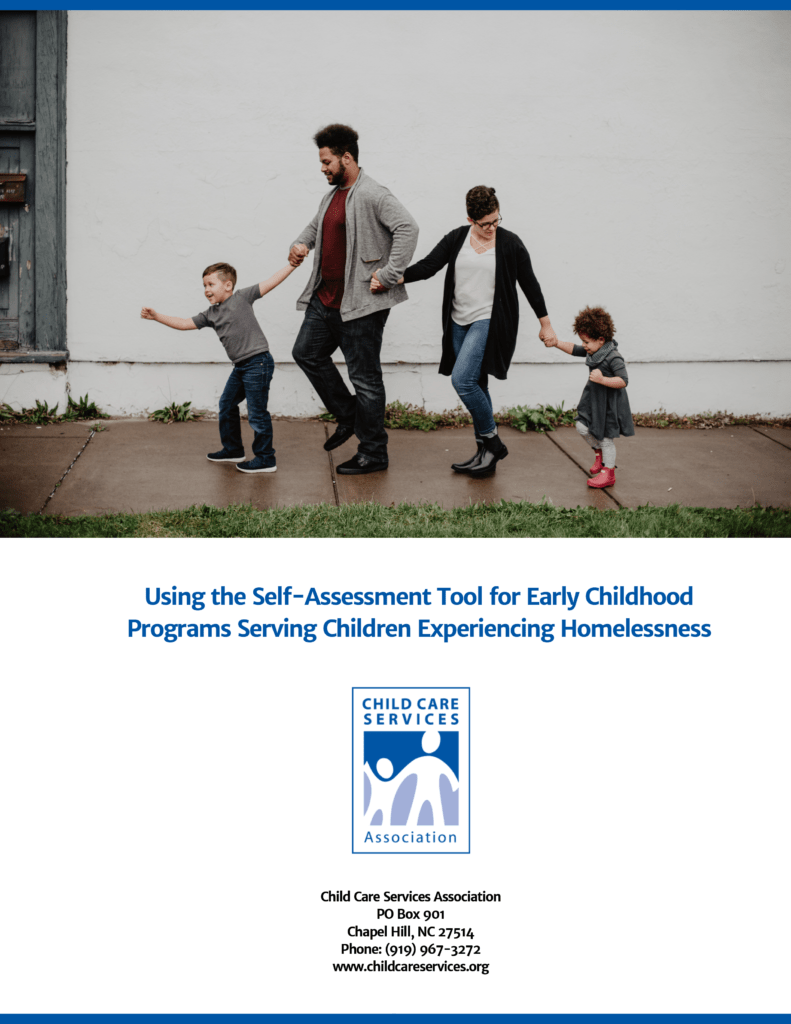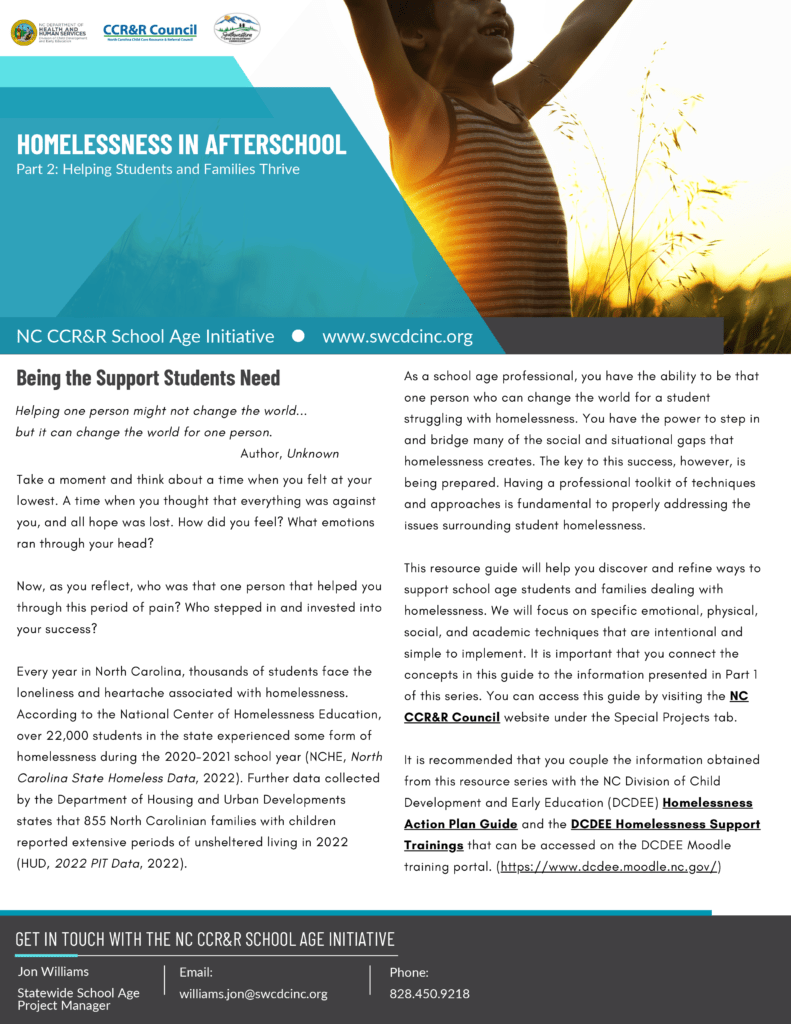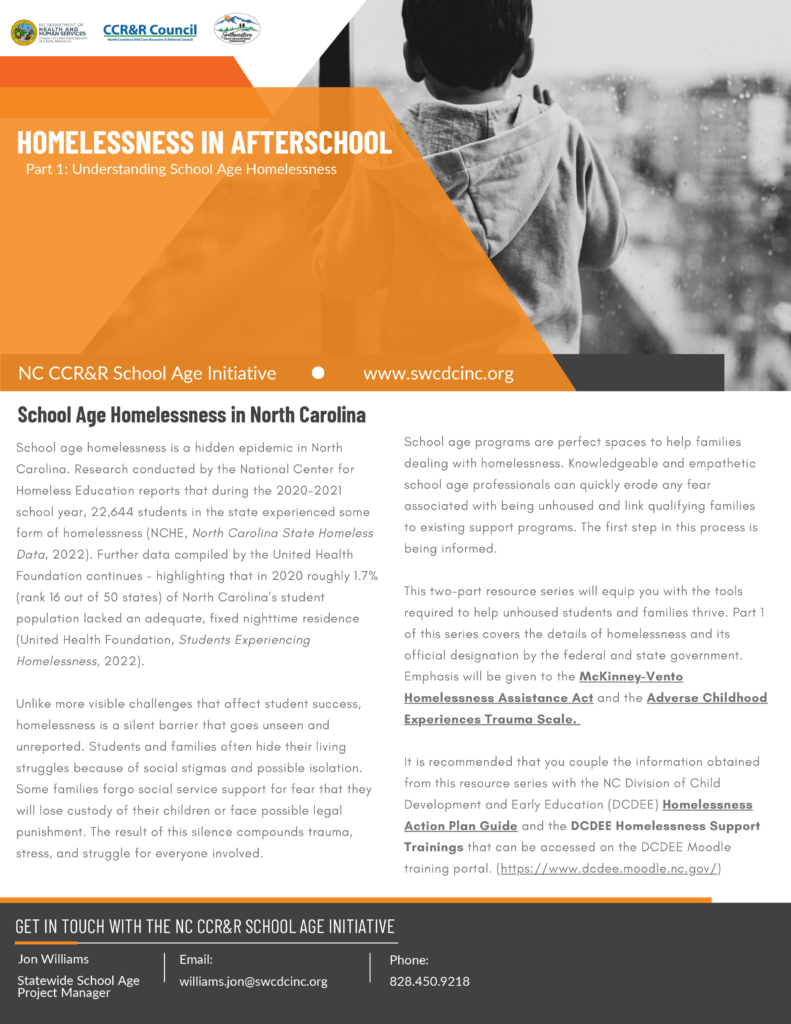Ensuring the early learning and development of our country’s youngest children is essential to Child Care Services Association’s (CCSA) work. Supporting the well-being of these young children and their families is an urgent task and one that is critical to improving the long-term educational outcomes of children nationwide.
What Research Shows
Research has established a strong connection between a young child’s early experiences and the development of his or her brain structure. We know that homelessness jeopardizes the health, early childhood development, and educational well-being of infants, toddlers, and preschool-aged children. It also creates unique barriers to participating in early care and education.
With nearly 50% of children living in federally-funded homeless shelters under the age of five, this is a problem for families, communities, states and the country. And, there are concerns today, that the COVID-19 health pandemic will increase family homelessness even more.
Enhance your knowledge around family homelessness and the McKinney-Vento Homelessness Assistance Act’s definition of “homeless” as it refers to children and youth.
Every child deserves a safe, warm home every night of the year. This is not the reality for more than 30,000 kids in North Carolina. Children experience homelessness at an astonishing rate in our state. We need you to help bring them home.
Join Child Care Services Association in the Bringing Families Home campaign. This broad-reaching awareness campaign needs the full community to share messages and awareness to help North Carolina Families.
It’s time to forget what we think we know about children experiencing homelessness and step up for families. View the Bringing Families Home campaign page and learn how you can help raise awareness.
Resources
Below are resources for child care professionals, community members and families to learn more and combat early childhood homelessness.
Learning Module for Early Childhood Programs Serving Children Experiencing Homelessness
The learning module, Using the Self-Assessment Tool for Early Childhood Programs Serving Families Experiencing Homelessness, is now available for use in early childhood programs serving children experiencing homelessness or programs that want to be ready to serve children experiencing homelessness. It is also a resource to be used by technical assistance and professional development staff who work with programs serving young children experiencing homelessness. The purpose of this module is to create awareness of the Self-Assessment Tool for Early Childhood Programs Serving Families Experiencing Homelessness and build capacity to use it in early childhood programs.
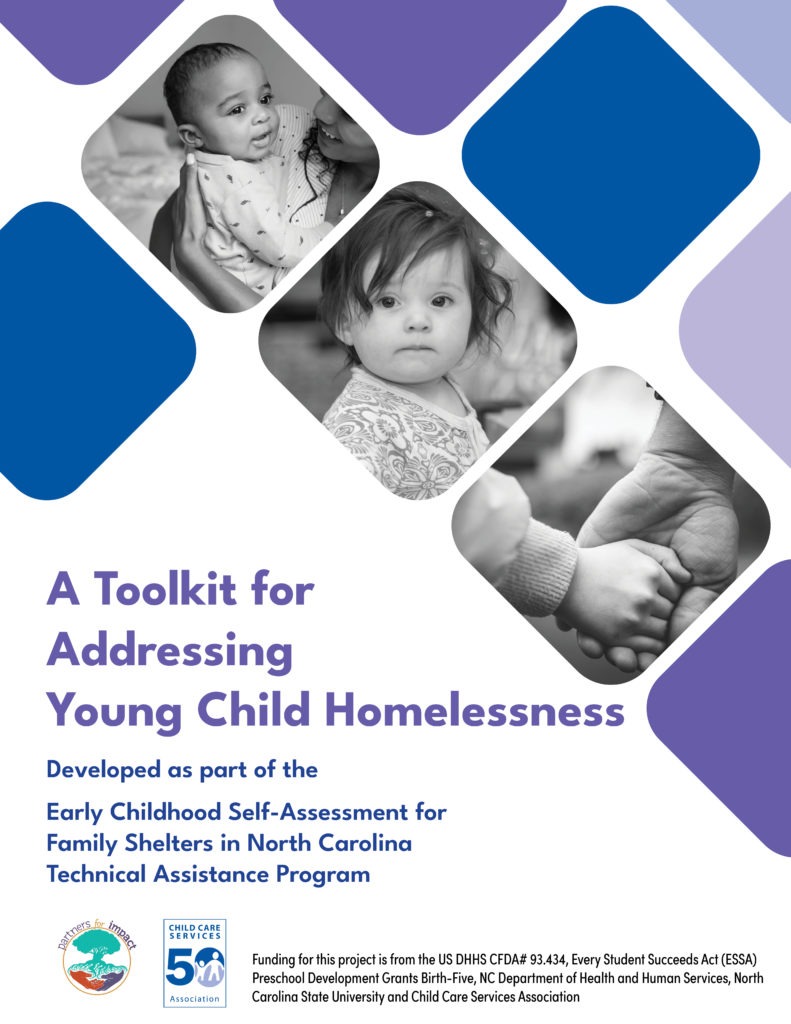
A Toolkit for Addressing Young Child Homelessness
The Toolkit for Addressing Young Child Homelessness provides guidance for emergency shelters and interim housing programs to evaluate and improve their services for young children ages 0-5 and their families. It accompanies the Early Childhood Self-Assessment Tool for Shelters (ECSAT), which helps agencies assess their current policies, environment, and programming.
Homelessness in Afterschool Resource Guide – Part 2
Every year in North Carolina, thousands of students face the loneliness and heartache associated with homelessness. According to the National Center of Homelessness Education, over 22,000 students in the state experienced some form of homelessness during the 2020-2021 school year (NCHE, North Carolina State Homeless Data, 2022). Further data collected by the Department of Housing and Urban Developments states that 855 North Carolinian families with children reported extensive periods of unsheltered living in 2022 (HUD, 2022 PIT Data, 2022).
Homelessness in Afterschool Resource Guide – Part 1
School age homelessness is a hidden epidemic in North Carolina. Research conducted by the National Center for Homeless Education reports that during the 2020-2021 school year, 22,644 students in the state experienced some form of homelessness (NCHE, North Carolina State Homeless Data, 2022). Further data compiled by the United Health Foundation continues – highlighting that in 2020 roughly 1.7% (rank 16 out of 50 states) of North Carolina’s student
population lacked an adequate, fixed nighttime residence (United Health Foundation, Students Experiencing Homelessness, 2022).
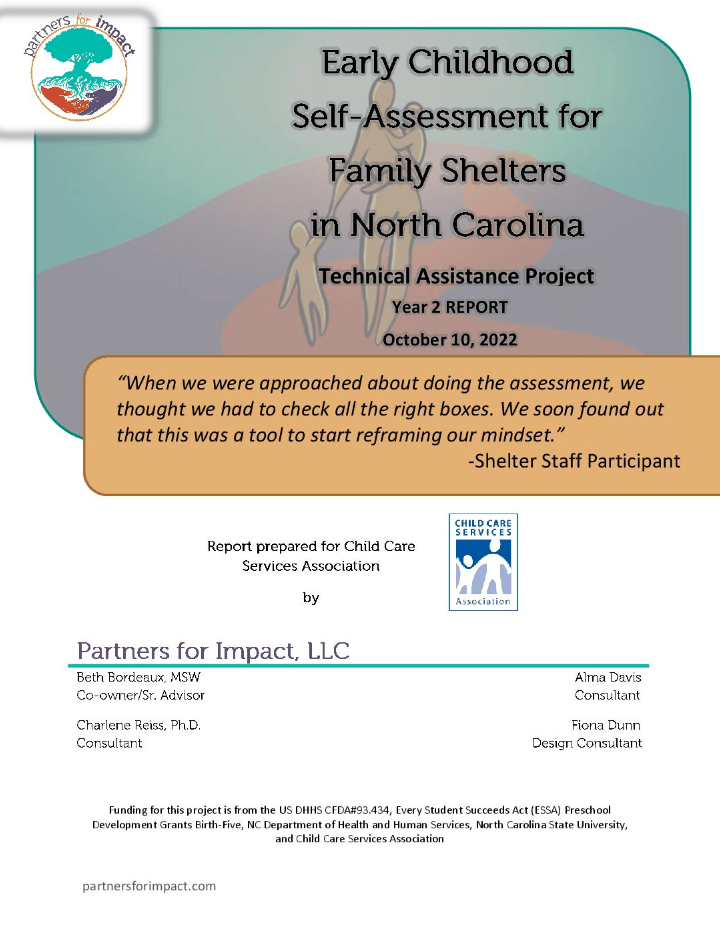
Early Childhood Self-Assessment for Family Shelters in North Carolina – Phase II Report
The purpose of this technical assistance project is to work to strengthen shelter environments in ways that facilitate the physical, socio-emotional and intellectual development of young children while also developing and deepening relationships between shelters and local Early Care and Education (ECE) programs. This report is prepared for Child Care Services Association by Partners for Impact, LLC. Funding for this project is from the US DHHS CFDA#93.434, Every Student Succeeds Act (ESSA) Preschool Development Grants Birth-Five, NC Department of Health and Human Services, North Carolina State University, and Child Care Services Association.
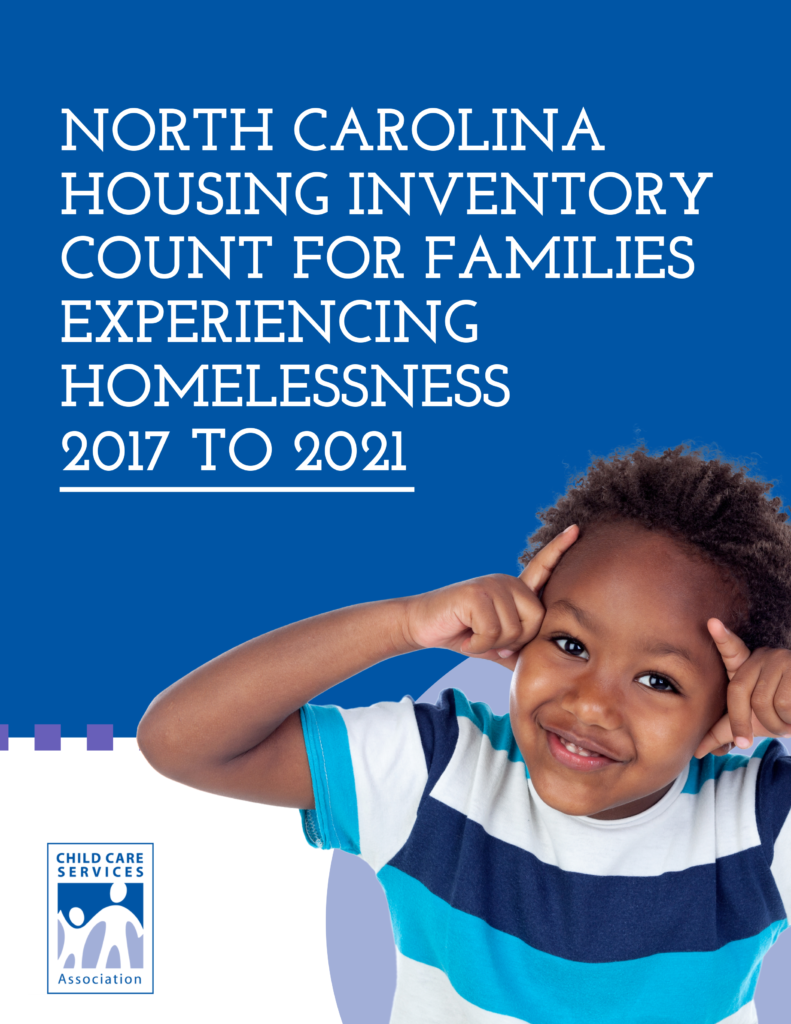
North Carolina Housing Inventory Count for Families Experiencing Homelessness 2017 to 2021
Child Care Services Association (CCSA) reviewed family bed and family unit counts in North Carolina over a five-year period, 2017 through 2021. CCSA compared the data year over year to examine and report on changes over time. Because HUD does not make any interpretations about year-to-year changes in the HIC reports, CCSA also does not speculate on the reasons for the changes. HUD cautions that while the data represents a large portion of the bed and unit inventory, it is not a complete inventory in any community or state. Beds and units are not always available during the period in which the count is completed, or the data about them is insufficient for HUD to categorize the information. Furthermore, local data may differ from HUD data and the reader may want to inquire about state or local level data in order to get a more robust picture of bed and unit inventory.
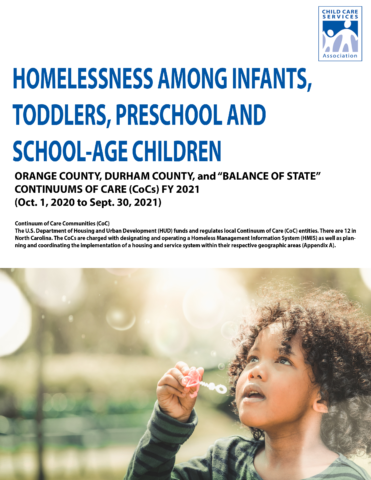
Homelessness Among Infants, Toddlers, Preschool and School-Age Children in North Carolina
Rosalind Kotz, Ph.D. and Scot Felderman with K&F Community Research and Planning Consultants knew that CCSA hoped to learn more about the homelessness of young children in North Carolina. Using their past research experience with the HUD data system, K&F examined HUD data specific to NC children under age 18, with a breakout of children birth to 5 to complete a new report, Homelessness Among Infants, Toddlers, Preschool and School-Age Children in Orange County, Durham County and “Balance of State” Continuums of Care, FY 2021. They were able to collect this data through the work and cooperation of the North Carolina Coalition to End Homelessness (NCCEH), which maintains the Homeless Management Information System (HMIS) data system for the Orange County, Durham County, and Balance of State CoCs.
Supporting Families Experiencing Homelessness: Child Care Policies
Ensuring the early learning and development of our country’s youngest children is essential to Child Care Services Association’s (CCSA) work. Supporting the well-being of these young children and their families is an urgent task and one that is critical to improving the long-term educational outcomes of children nationwide.
Access to high-quality child care is a key work support for parents. It also helps support healthy child development, which is important for all children, but of critical importance to young children in families experiencing homelessness.
Child Care Services Association reviewed the FY2022-2024 Child Care and Development Fund (CCDF) State Plans to see policies and strategies across states to better support the needs of families with young children experiencing homelessness.
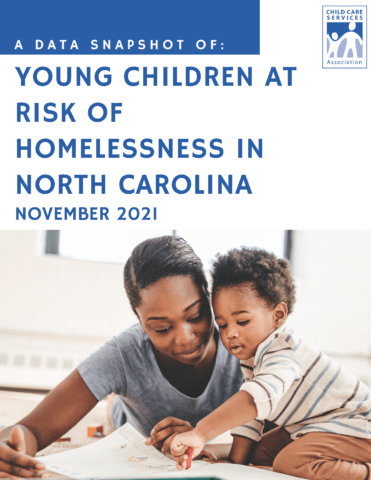
A Data Snapshot of Young Children at Risk of Homelessness in North Carolina
This document, A Data Snapshot of Young Children at Risk of Homelessness in North Carolina, was designed to enhance our understanding of the risk factors associated with homelessness among North Carolina families with very young children (under age 6). It provides a basic demographic profile along with data on documented risk factors that include parental characteristics, economic conditions, and housing market factors. We hope this information is helpful in our work to best meet to meet the needs of young children and families in our communities and in our state.
Innovative Early Childhood Services for Families Experiencing Homelessness: A Statewide Conversation
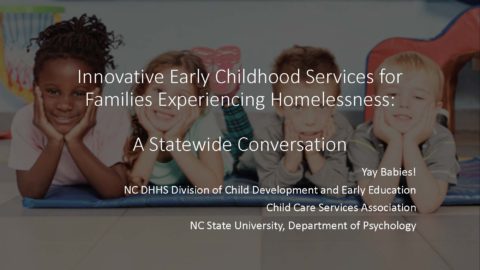
November 2, 2021: This webinar kicks off the public efforts of a Yay Babies Strategic Plan. NC submitted this work as part of the NC Preschool Development Grants Birth-Five grant. North Carolina State University and Child Care Services Association have a small piece of this effort. The strategic planning is part of this work. It is a multi-year process.
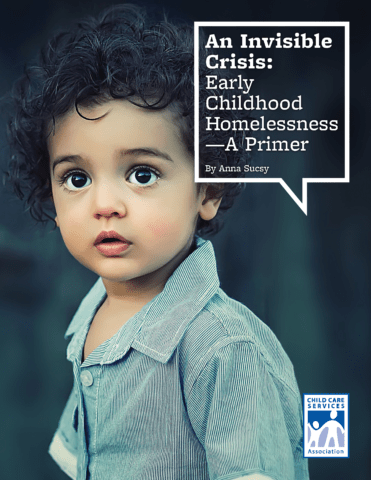
An Invisible Crisis: CCSA Releases a Primer on Early Childhood Homelessness
Child Care Services Association (CCSA) released this paper which reviews (1) the extant literature on the impact of homelessness on young children’s health, well-being and development, (2) the extant literature on the causes of child and family homelessness, (3) available services and federal funding streams to support young children and families experiencing homelessness. This paper concludes with recommendations to streamline early childhood and homelessness policy to better support young children experiencing homelessness.
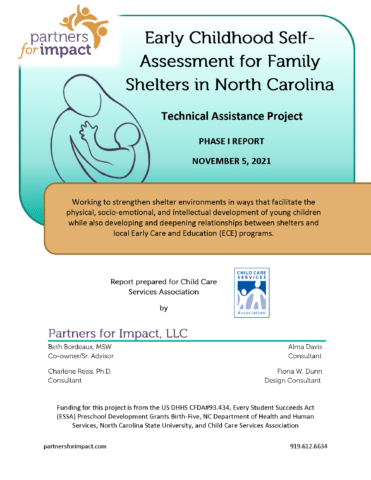
Early Childhood Self-Assessment for Family Shelters in North Carolina – Phase I Report
The purpose of this technical assistance project is to work to strengthen shelter environments in ways that facilitate the physical, socio-emotional and intellectual development of young children while also developing and deepening relationships between shelters and local Early Care and Education (ECE) programs. This report is prepared for Child Care Services Association by Partners for Impact, LLC. Funding for this project is from the US DHHS CFDA#93.434, Every Student Succeeds Act (ESSA) Preschool Development Grants Birth-Five, NC Department of Health and Human Services, North Carolina State University, and Child Care Services Association.
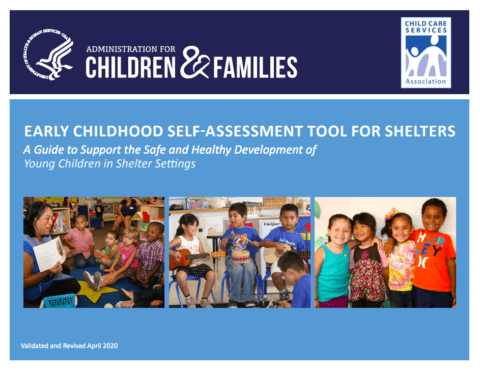
CCSA Releases Validated Tool for Homeless Shelters to Provide Positive Environments for Young Children
Child Care Services Association (CCSA) released the validated and revised Early Childhood Self-Assessment Tool for Shelters specifically designed to help shelter staff create safe, developmentally appropriate environments for young children and their families. The Administration for Children and Families (ACF) originally developed the Self-Assessment tool in 2014, and has supported and participated in the validation and revision process.
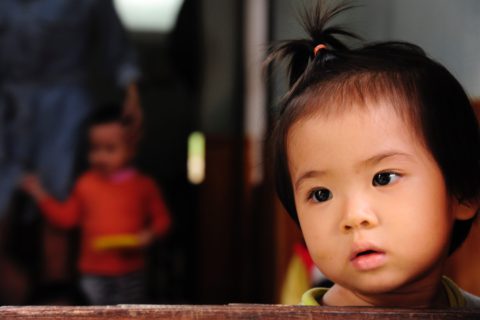
Early Childhood Homelessness: A Look at CCDF State Policies for 2019-2021
Families with jobs and secure housing access child care through our country’s Child Care Resource & Referral network, friends and family and the internet. Without child care, families experiencing homelessness struggle to secure housing. And yet, for these families, accessing child care offers two important benefits—the chance to be able to participate in job training, education, and other programs essential to resolving their homelessness and the opportunity to have a safe setting for children to grow!
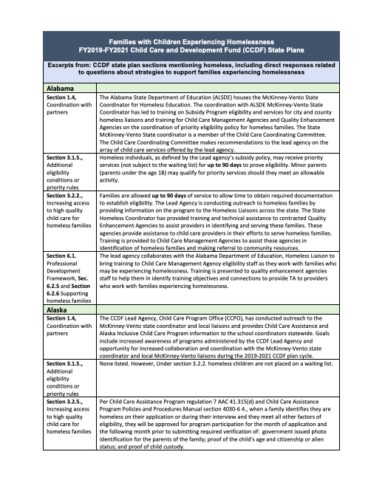
Families with Children Experiencing Homelessness: FY2019-FY2021 Child Care and Development Fund (CCDF) State Plans
CCDF state plan sections mentioning homeless are from publicly available CCDF plans.

Eight Modules for Supporting Children and Families Experiencing Homelessness — Head Start
This interactive learning series is intended for professionals in Head Start, Early Head Start and child care, including early childhood and school-age child care providers, CCDF Lead Agency or designated entity staff and other key stakeholders. Learn how to identify families experiencing homelessness, conduct community outreach, and much more. Look for these modules on Moodle NC soon!
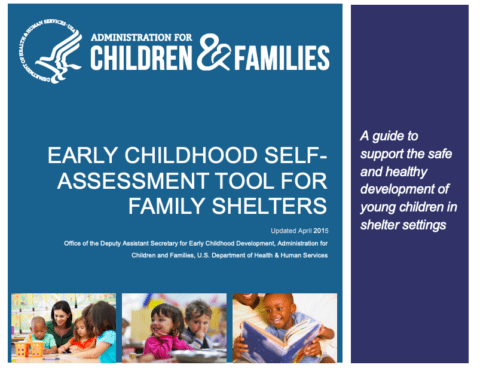
Early Childhood Self Assessment Tool for Family Shelters
Created by the Office of the Deputy Assistant Secretary for Early Childhood Development, Administration for Children and Families, U.S. Department of Health & Human Services, the Early Childhood Self Assessment Tool for Family Shelters is a guide to support the safe and healthy development of young children in shelter settings.
This guide is designed to help the shelter environment assist the physical, socio-emotional and intellectual development of children ages 0-5 to support these children through their experience of homelessness. There are a number of links to resources in the tool.
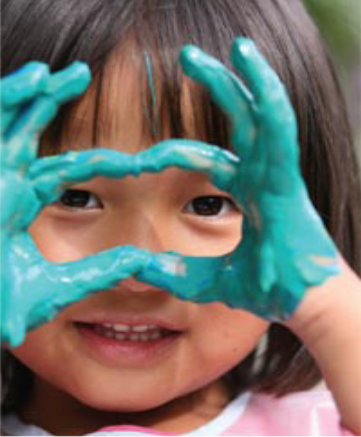
Birth to 5: Watch Me Thrive! A Housing and Shelter Provider’s Guide to Developmental and Behavioral Screening
Birth to 5: Watch Me Thrive! is a coordinated federal effort to encourage healthy child development, universal developmental and behavioral screening for children, and support for the families and providers who care for them.
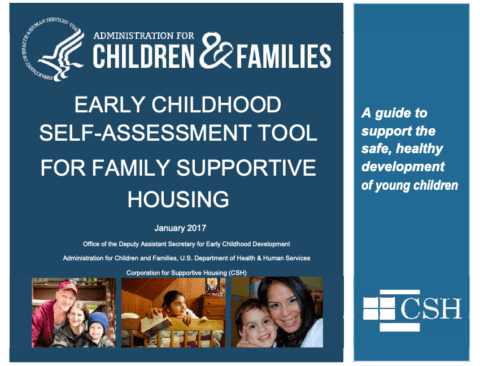
The Early Childhood Self Assessment Tool for Family Supportive Housing
A guide to support the safe, healthy development of young children. Family supportive housing provides essential services to infants, toddlers, and preschoolers during a stressful yet promising time in their lives, moving into and settling in a permanent, affordable supportive housing unit of their own! Supportive housing can play a critical role in the safety and the physical, socio-emotional, and intellectual development of children ages 0-5.
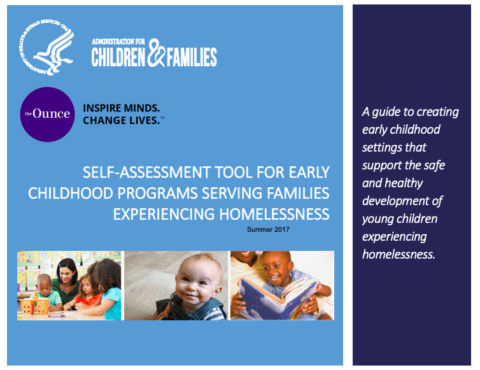
Self-Assessment Tool for Early Childhood Programs Serving Families Experiencing Homelessness
A guide to creating early childhood settings that support the safe and healthy development of young children experiencing homelessness. This tool is for early childhood programs as a guide for welcoming and supporting families and children experiencing homelessness into these programs. Early care and education providers play a critical role in identifying and supporting families with young children who are experiencing homelessness and connecting those families to other resources within their community.
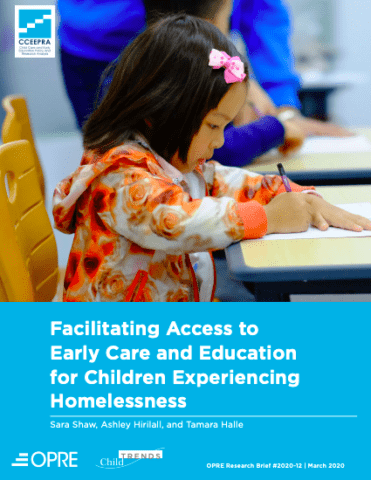
Early Care and Education Supports for Young Children Experiencing Homelessness from ACF
The experience of homelessness is a known risk factor for young children’s development and well-being. High-quality early care and education may help children overcome some of the negative factors associated with homelessness. However, states, communities and early care and education providers face many barriers to ensuring access to care for these young children, including challenges with identifying children who are or are at risk of experiencing homelessness.
This two-brief series provides important information about access to care for young children and their families who are experiencing homelessness.
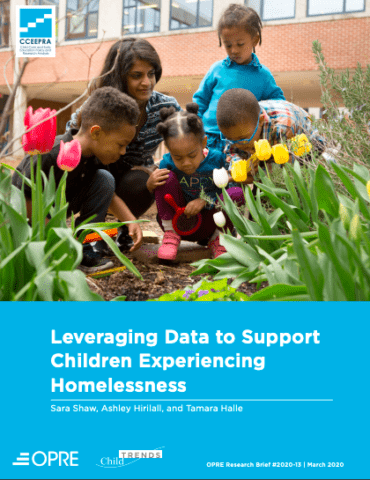
- Facilitating Access to Early Care and Education for Children Experiencing Homelessness presents a discussion of the barriers to accessing early care and education among families experiencing homelessness, and a description of ways in which states and communities support the enrollment of children experiencing homelessness in early care and education.
- Leveraging Data to Identify Children Experiencing Homelessness examines the challenges that states and communities face in using data to identify children experiencing homelessness for early care and education.
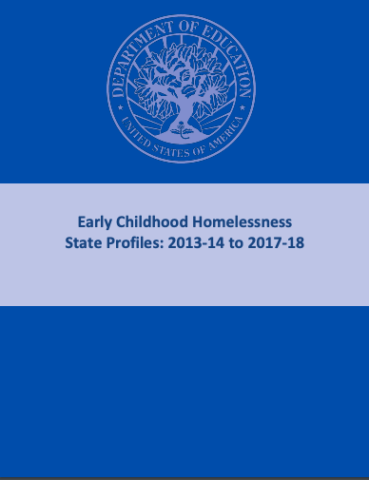
Early Childhood Homelessness State Profiles
- Early Childhood Homelessness in the United States: 50-State Profile – released 2016
- Early Childhood Homelessness in the United States: 50-State Profile – released 2017
- Early Childhood Homelessness in the United States: 50-State Profile – released 2018
- Early Childhood Homelessness in the United States: 50-State Profile – released 2019
- Early Childhood Homelessness State Profiles: 2013-14 to 2017-18 – released 2020
- Early Childhood Homelessness State Profiles: 2018-2019 – released 2021
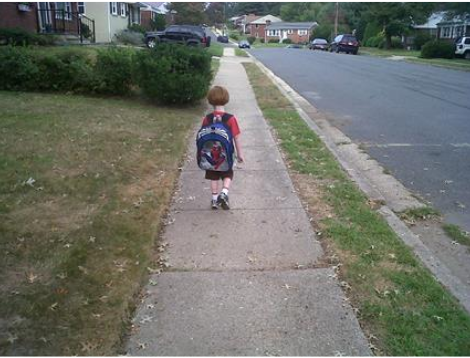
Policy Statement on Meeting the Needs of Families with Young Children Experiencing and At Risk of Homelessness
This is a joint policy statement from the U.S. Department of Health and Human Services, the U.S. Department of Housing and Urban Development and the U.S. Department of Education as of October 2016.

Home at Head Start: New National Campaign on Homelessness
This campaign challenges Head Start programs to enroll more children and families experiencing homelessness. Use the featured resources to educate staff and reduce the stigma around homelessness.
Sesame Street in Communities: Family Homelessness
Losing one’s home brings enormous challenges, yet families can be incredibly strong and determined to create a better future. Every family can build a sense of hope and learn ways to cope…and remember that no one is alone.
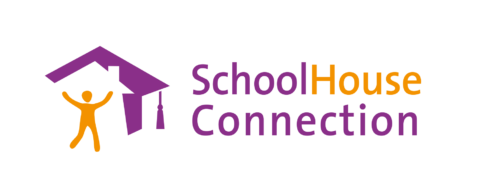
SchoolHouse Connection
SchoolHouse Connections promotes success for children and youth experiencing homelessness, birth through higher education. SHC engages in policy advocacy and provides technical assistance to states and local communities.
The earlier and longer the duration of homelessness, the greater the toll it takes on a child’s health and development. Babies who experience homelessness are at great risk of harm that can set them back in life. They need our attention and action. Below are two studies on the impact of homelessness before birth and during infancy:
- COVID-19 and Homelessness: Checklist for LEAs and Early Childhood Providers
- Five Ways to Protect Infants, Toddlers, and Preschoolers Experiencing Homelessness During COVID-19

Yay Babies!
Promoting Access to Early Childhood Services for Young Children Experiencing Homelessness.
- Yay Babies! NC (PDF)
- Updated Data Recommendations for the NC Early Childhood Action Plan Yay! Babies – 2021 (PDF)
- Data Recommendations for the NC Early Childhood Action Plan Yay! Babies – 2019 (PDF)
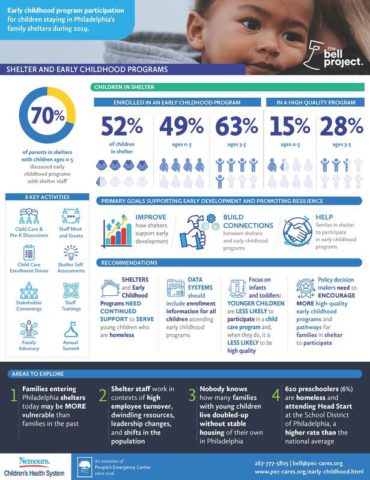
Building Early Links for Learning (BELL)
Building Early Links for Learning (BELL) is an initiative that aims to promote resilience for young children staying in Philadelphia emergency and transitional shelter with their families. BELL is informed by developmental science which states that resilience is more likely to occur when a child’s and family’s contexts are focused on responding to their needs. BELL is administered by People’s Emergency Center and is currently funded by a grant from the Vanguard Strong Start for Kids TM program.
Child Care Services Association Early Childhood Homelessness Activities
CCSA President Marsha Basloe presents information on early childhood homelessness. Below are recent activities.
- Innovative Early Childhood Services for Families Experiencing Homelessness: A Statewide Conversation on November 2, 2021. This webinar kicks off the public efforts of a Yay Babies! Strategic Plan. N.C. submitted this work as part of the NC Preschool Development Grants Birth-Five grant. North Carolina State University and Child Care Services Association have a small piece of this effort. The strategic planning is part of this work. It is a multi-year process. View presentation.
- Addressing the Educational Challenges of Early Childhood Homelessness Through Cross-sector Collaboration & Research Across the Policy Lifecycle at the 2020 APPAM Fall Research Conference with Amy Yamashiro, U.S. Department of Education, OPEPD, OCDO; Bernadine Futrell, National Head Start Association; Mandy Sorge, National Association for Early Childhood Specialists in State Departments of Educatin; Barbara Duffield, SchoolHouseConnection; and John McLaughlin, U.S. Department of Education, OESE, OFG on Nov. 13, 2021. View presentation.
- Supporting Young Children Experiencing Homelessness at the PDG B-5 Convening with Parnters for Impact, Families Moving Forward and NC DHHS on Oct. 18, 2021. View presentation.
- Increasing Access to Subsidized Child Care for Children Experiencing Homelessness at the NAEHCY Annual Conference with Laura Hewitt, NC DCDEE and Grace Whitney, SchoolHouse Connection, on Nov. 3, 2019, in Washington D.C. Read more on page seven.
- An Introduction to Young Children and Families Experiencing Homelessness by Grace Whitney and Marsha Basloe in the ZERO to THREE Journal – Read in March 2019: Young Children And Families Experiencing Homelessness issue.

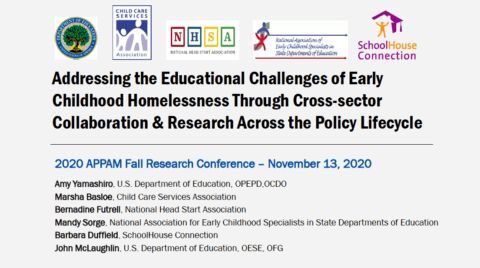
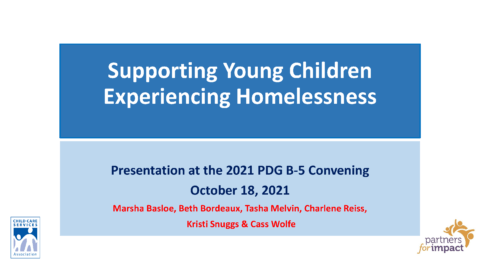
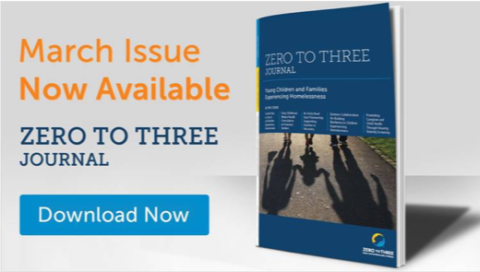
Join the Bringing Families Home Mailing List
Join Child Care Services Association in the Bringing Families Home campaign. This broad-reaching awareness campaign needs the full community to share messages and awareness to help North Carolina Families.
Early Childhood Homelessness News
-


N.C. Governor Appoints CCSA President Marsha Basloe to State Interagency Council for Coordinating Homeless Programs
Child Care Services Association President Marsha Basloe Brings the Perspective of Early Childhood Homelessness to N.C. Interagency Council for Coordinating Homeless Programs. -


The Top Ten Blogs of 2021 Show What to Expect in 2022
Supports for child care, the early childhood workforce and early childhood homelessness were on the mind of our families, early childhood providers, advocates, politicians and communities in 2021. -
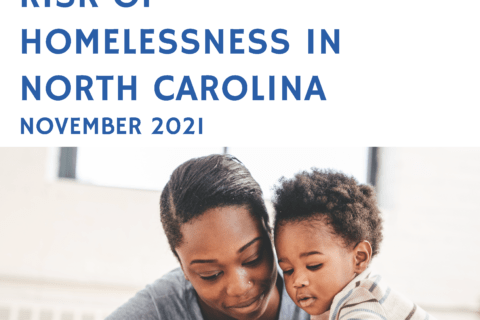

A Data Snapshot of Young Children at Risk of Homelessness in North Carolina
This document was designed to enhance our understanding of the risk factors associated with homelessness among North Carolina families with very young children (under age 6).
